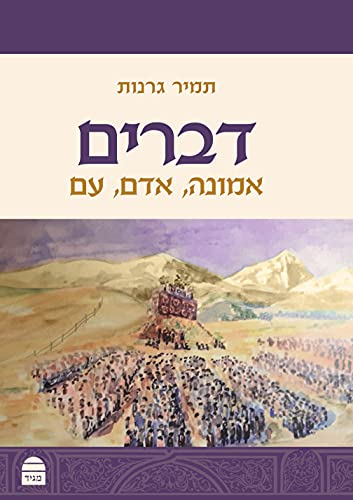דברים: אמונה, אדם, עם
Authors
Tamir Granot הרב ד״ר תמיר גרנותSynopsis
התורה הייתה כבר כמעט סגורה וחתומה, דבר ה' למשה רבנו כבר פסק. והנה באותה שעה גורלית, כמה שבועות לפני מותו ולפני הכניסה לארץ ישראל, דיבר משה אל כל ישראל את כל אשר ציווה ה', העמיד את יסודות האמונה, חזר על הסיפורים העיקריים שבתורה והניח את הבסיס הערכי לחיים בארץ ישראל. לכאורה חזרה וביאור, אך למעשה אין ולו מצווה אחת שחזר עליה משה כלשונה, ואף לא סיפור אחד שלא השתנו בו פרטים מהותיים.
נאומו זה של משה הוא הספר החמישי של התורה: ספר דברים, ומבחינה פרשנית הוא מציב אתגר עצום לחז"ל ולפרשני התורה מאז ועד היום. מדוע הפך נאומו של משה לחלק מהתורה? מדוע ספר דברים שונה כל כך מקודמיו? מדוע מצוות רבות ויסודות ערכיים, כגון: הלכות מדינה ומלחמה, מצוות אהבת ה', פרשת התשובה ועוד, מופיעים לראשונה רק בספר דברים? ובעיקר, האם העובדה שמשה אמר את התורה בלשונו ובסגנונו, משפיעה על רעיונותיה ותכניה?
דברים: אמונה, אדם, עם מציע תשובה שיטתית לשאלת חידושו ומשמעותו של ספר דברים באמצעות קריאה חדשה על דרך הפשט של רוב רובן של פרשיותיו לכלליהן ולפרטיהן. יש בו פירוש וביאור מפורט של הספר כולו, בהשוואה קפדנית לספרי התורה האחרים, ויחד עם זאת, יש בו התייחסות נרחבת למשמעותם של הדברים, לממד ההגותי שלהם ולהשלכות האפשריות שלהם על אדם מישראל בן זמננו.
הרב ד"ר תמיר גרנות, ראש ישיבת ההסדר אורות שאול בתל אביב, עוסק בתורה שבכתב ושבעל־פה, ומלמד הגות יהודית וחסידות. מחבר הספר: אמונה ואדם לנוכח השואה (שני כרכים, תשע"ג).
***
The Torah was nearly complete, God's word to Moses had already ceased. In that fateful hour, a few weeks before his death, and before the Jewish people entered the land of Israel, "Moses spoke to the entire Jewish people, telling all that God had commanded him." He established the foundations of belief, reviewed the major stories in the Torah, and laid the ethical foundation for life in Israel. Superficially, it seems to be mere repetition and explanation, but actually, there is not a single mitzva that Moses repeats in the exact same way, nor a single story whose details did not change in the retelling. Moses' speech constitutes the fifth book of the Torah, the book of Deuteronomy, and from an exegetical perspective, it has always presented a profound challenge to rabbinic commentaries. Why did Moses' speech become a part of the Torah? Why is Deuteronomy so different from its predecessors? Why do many mitzvot and foundational values, such as the laws of the state and war, the law of loving God, the section on repentance, and others, appear for the first time only in the book of Deuteronomy? And primarily, does the fact that Moses spoke in his own language and style affect the message and content of the book? Devarim: Belief, Person, Nation offers a systematic answer to the questions that presents the uniqueness and the meaning of the book of Deuteronomy, through an innovative, close text-based reading of its chapters, from their general ideas, down to their particular details. It contains a detailed commentary and explanation of the entire book, including careful comparison to the other books of the Torah, along with extensive discussions of the philosophical significance of its ideas, and the possible implications these carry for people in contemporary times.
Publisher:
Maggid
Pages:
926
Date Published:
2021
